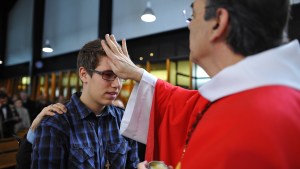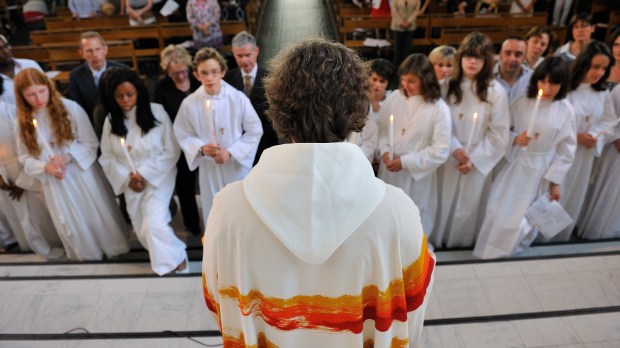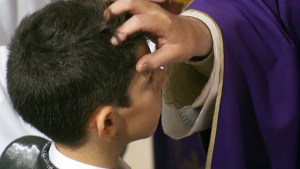In the Roman Rite of the Catholic Church, any baptized Catholic can be confirmed, regardless of age.
This means that a 90-year old who was never confirmed can receive the sacrament of confirmation, as well as a tiny baby who is in danger of death.
The Catechism of the Catholic Church explains that, “For centuries, Latin custom has indicated ‘the age of discretion’ as the reference point for receiving Confirmation. But in danger of death children should be confirmed even if they have not yet attained the age of discretion” (CCC 1307).
For Eastern Catholics, as well as Eastern Orthodox, the celebration of confirmation always occurs at baptism, a practice that emphasizes the reality that both sacraments are sacraments of initiation.
However, while any baptized Catholic can be confirmed, the common practice in the Roman Rite of conferring confirmation has been left-up to each diocese or Episcopal Conference, as the Code of Canon Law explains.
The sacrament of confirmation is to be conferred on the faithful at about the age of discretion, unless the Episcopal Conference has decided on a different age, or there is a danger of death or, in the judgment of the minister, a grave reason suggests otherwise.
Can. 891
This can be widely varied throughout the world. Some dioceses confirm at the age of 7, while others wait until children are 16 or 17 years old.
Whatever age a person is confirmed, the key is to remember the whole purpose of confirmation, as the Catechism summarizes.
Preparation for Confirmation should aim at leading the Christian toward a more intimate union with Christ and a more lively familiarity with the Holy Spirit – his actions, his gifts, and his biddings — in order to be more capable of assuming the apostolic responsibilities of Christian life. To this end catechesis for Confirmation should strive to awaken a sense of belonging to the Church of Jesus Christ, the universal Church as well as the parish community. The latter bears special responsibility for the preparation of confirmands.
CCC 1309
Confirmation is a beautiful sacrament, one that prepares an individual to be an active part of the Church, ready to confront the many challenges of the world.



